Love. Justice. Future.
Speeches are meant to inspire, to transform.
Listening to the eloquence of a man dedicated to a cause sends rippling chills through anyone willing to hear, to act. I felt that way again as I heard and read Martin Luther King Jr.’s words preparing to celebrate his life and legacy today.
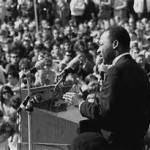 King allowed words to be the velvet-covered fist of truth. He sought to woo his enemies, winsomely attracting those he sought to bring to his side. King questioned the “moderate” person who wanted to reduce tension without sacrifice. MLK knew that the way forward was the way through.
King allowed words to be the velvet-covered fist of truth. He sought to woo his enemies, winsomely attracting those he sought to bring to his side. King questioned the “moderate” person who wanted to reduce tension without sacrifice. MLK knew that the way forward was the way through.
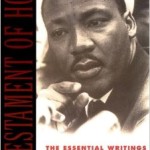 In my reading of A Testament of Hope: The Essential Writings and Speeches of Martin Luther King Jr. I noticed three salient principles that drove King’s life; now, his legacy.
In my reading of A Testament of Hope: The Essential Writings and Speeches of Martin Luther King Jr. I noticed three salient principles that drove King’s life; now, his legacy.
Love “Agape” should be one Greek word that everyone knows reading or hearing King’s words. Over and over MLK said
“You begin to love men not because they are likable, not because they do things that attract us, but because God loves them and here we love the person who does the evil deed while hating the deed the person does.”
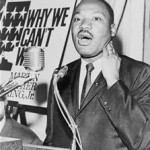 King believed that love stood against “evil systems,” motivated by “good will, acting with wise restraint and calm reasonableness but you must keep moving.” MLK founded Civil Rights upon this agape called the movement “an eternal moral issue which may well determine the destiny of our civilization.”
King believed that love stood against “evil systems,” motivated by “good will, acting with wise restraint and calm reasonableness but you must keep moving.” MLK founded Civil Rights upon this agape called the movement “an eternal moral issue which may well determine the destiny of our civilization.”
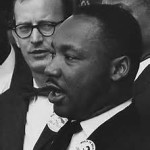 Justice The name “Martin Luther” should stand out to anyone who knows something of Church history. King’s father was named for the great Reformation leader. “Here I stand. I can do no other,” words from the protester-Protestant Martin Luther, echo through the speeches, writings, and life of Martin Luther King Jr. himself.
Justice The name “Martin Luther” should stand out to anyone who knows something of Church history. King’s father was named for the great Reformation leader. “Here I stand. I can do no other,” words from the protester-Protestant Martin Luther, echo through the speeches, writings, and life of Martin Luther King Jr. himself.
The justice King wanted during The Civil Rights Movement emanated from the justice of any protester or “Protestant” desires: just, fair, equitable treatment is based on a foundation of truth. “Truth” cannot come simply through whim, claimed by anyone, based on individual desire. The truth of justice must have a Transcendent source, as King said, “I believe in a personal God.”
I still believe that standing up for the truth of God is the greatest thing in the world. This is the end of life. The end of life is not to be happy. The end of life is not to achieve pleasure and avoid pain. The end of life is to do the will of God, come what may.
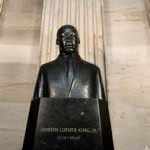 King alluded to Colossians 1.12-13 seeing injustice as “the forces of light versus the forces of darkness.” King’s clarion call to nonviolence was founded upon justice, “the love of God working in the minds of men.”
King alluded to Colossians 1.12-13 seeing injustice as “the forces of light versus the forces of darkness.” King’s clarion call to nonviolence was founded upon justice, “the love of God working in the minds of men.”
Future But if there is one idea upon which King focused it was upon who would follow him. MLK referred to youth as “the face of the future, the generation of integration.” Speaking of the student marches, King noted these were “movements of faith, of hope . . . singing ‘we shall overcome.'”
Some will say we have come a long way since the days of Martin Luther King Jr. But too often we forget the past, we do not teach our history, and we fail to remind those who follow, whom they should never forget. We must keep his speeches, his writings, his words in our teaching and living; in this way we honor the life and legacy of Dr. Martin Luther King Jr.
For all people, no matter one’s ethnicity, nationality, language, gender, or life’s station: we all celebrate Martin Luther King Jr. Day, today. Dr. Mark Eckel is president of The Comenius Institute.

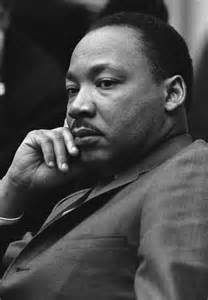
Thank you for continually teaching.
The one true God had a purpose and plan for this great man, Martin Luther King, Jr., as He does for all of us.